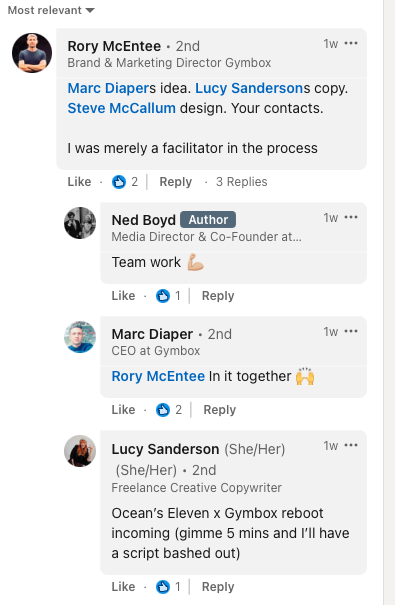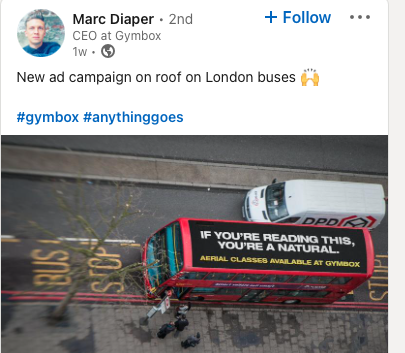Why Gymbox's fake ad crossed a line

Opinion: 100% Media 0% Nonsense
Fake ads are not something we should tolerate unless advertisers own up to them and accept the risks of dishonesty, writes the editor.
You would think someone with the name Marc Diaper would be especially sensitive about giving people reasons to suggest he is full of shit.
But yet the Gymbox CEO has been revealed to be the creative mastermind behind a phantom ad to promote something called “aerial pilates”. In case you’ve not been following this story, Gymbox has gleefully been dumping electronic versions of excrement all over the internet recently in an apparently desperate bid to advertise without actually bothering to do the work of advertising.
The story was apparently irresistible: ourselves, Campaign, The Drum and others reported this as the launch of a fun outdoor activation. While not being entirely original (the Economist first did it in the 90s) it was novel enough, we thought, to be worth a story during the relatively quiet summer period.
Then Transport for London informed us that no such ad had been booked. Nor could it ever be booked under current transport regulations, which now prohibit ads on the top of buses that would obscure identification numbers. And even if it were allowed, the modern hybrid buses’ roofs are painted with reflective material that make them unsuitable as billboards.
It then transpired that the picture Gymbox sent us of the ad was merely a stock Alamy photo taken in 2019. This picture was sent to numerous publications claiming that the ad campaign had been launched.
They told The Media Leader that the ad had been created in-house, and that it had bought the media in-house. They told Campaign that 12 London buses had been booked to run the ads for a week. The italics, in this instance, are to clarify things this brand told us that were completely untrue.
‘Brand reputations at risk’: outdoor media warnings over rise of fake ads
Since then, we have repeatedly asked Gymbox why they had done this. They have repeatedly ignored or unreturned our requests. Of course we can speculate why: perhaps the free editorial coverage they’ve got from a bunch of B2B publications is ‘worth it’. Perhaps every further word I write about this is playing more and more into their hands.
But here’s the thing: if it is ‘worth it’ to treat the industry in this way, then we’re all in trouble.
Is that really you?
I’ve thought long and hard to come up with the best way of explaining why this Gymbox fake ad is so pernicious and dangerous.
Forgive me, but the picture (above) is the best I can do. Here I am, naked, busking in the middle of Oxford Circus to promote my favourite hobby: pretending to play the guitar.
Except I’ve never actually stood in the middle of Europe’s busiest thoroughfare wearing nothing but a Fender strat around my shoulder. And, as my wife can attest, I’m not as ripped as the image would have you believe.
But, most importantly, I am not brave enough to bare my bum in the street. I suspect most of you reading this are not either.
There is a big difference between saying you’re going to do something bold in public and then actually doing it.
Smug one day, silent the next
Amazingly, I had already made this point in a column published just two days before we were sent this fake ad. Outdoor media is the number-one target for fake ads because of the superpower of social proof: making a statement in public on a billboard means a lot.
Even more amazingly, Gymbox’s own marketing director Rory McEntee had said pretty much the same thing just three months ago in an opinion piece published by Marketing Week.
“The speed at which ads are now shared socially and how we consumer [sic] media is incredible. But quite often, consumers don’t know the source,” McEntee wrote. “In fact, the power of social means we believe it without question, share and even credit the brand itself for the ad, where in many cases it’s not legitimate.”
 I wonder what happened between May and August, when McEntee told us in the fake ad press release: “we thought the roofs of London buses would be the perfect advertising space for prospective class users. After all, it’s quite a unique place to feature an ad, almost as unique as our aerial classes.”
I wonder what happened between May and August, when McEntee told us in the fake ad press release: “we thought the roofs of London buses would be the perfect advertising space for prospective class users. After all, it’s quite a unique place to feature an ad, almost as unique as our aerial classes.”
No you didn’t, Rory. You never thought it and you never bought it.
I know this because you said so on LinkedIn, where you and Diaper were smugly giving each other emoji high-fives after having just mugged off your peers. “Marc Diaper’s idea”, you commented. “I was merely a facilitator in the process.”
As was your PR agency, an outfit called Cut the Bull, whose slogan is “creative comms without the bullshit”.
It’s at this point that I have to remind you that this column is not some elaborate gag. If nothing else gets you out of bed in the morning, rest assured that media and advertising is always surprising.
Call out fake ads
Nor is it all that funny, you realise. The wider problem, as I pointed out in my previous column, is that it’s becoming too easy to put out misinformation on social media. If Mr Diaper and his employees are allowed to put out social media posts promoting ads that do not actually exist, or misinform media publications about booking ad campaigns when they’ve just photoshopped a slogan onto a picture, it’s just further eroding everyone’s trust in media.

As you can see, at no point does Diaper indicate on social media that this is a fake ad. Perhaps with hindsight, the “#anythinggoes” reference was a clue, but it’s hardly letting people in on the gag if it was a gag.
“We will soon need rules in place for fake ads, just like we did for paid influencer campaigns,” said Spark Foundry’s chief strategy and innovation officer Marcos Angelides. Indeed, as we reported at the time, the Advertising Standards Authority has no remit to investigate Gymbox because there is no ad to investigate.
We have sought throughout this year to carefully and diligently report on trust issues in this industry, of which there are unfortunately many. Trust in media was the number-one issue that this industry’s senior leaders and delegates at our Future of Media conference told The Media Leader to focus on this year as a topic of concern. I suspect trust will feature heavily again when we run a new debate at The Future of Media 2023, which returns next month.
Alex Thompson, head of international growth at travel media company Ink Global, reacted to our coverage by suggesting that what Gymbox did should be illegal: “It makes a mockery of the communications industry, business integrity and, moreover, represents the type of mis/disinformation that is the source of many of our biggest current challenges.”
I’m not sure how this would work in practice but it feels like there is a loophole which needs to be closed.
Because McEntee is right, brands need to call out fake ads. I believe brands need to be clear about what they stand for.
Our brand, The Media Leader, champions an industry of people who are passionate about media and want to see it thrive by bringing prosperity and furthering our culture. Media can’t do any of these things unless people can rely on a default state in which people and companies are telling the truth.
That’s why I’m not just going to shrug my shoulders when my publication has been duped and just quietly move on to the next story. Why should my readers trust us if we’re willing to accept that as normal behaviour?
It’s not my business, but you have to wonder if you’re a Gymbox customer, shareholder, or employee: why should they tolerate this behaviour either?
 Omar Oakes is editor-in-chief of The Media Leader and leads the publication’s TV coverage. ‘100% Media 0% Nonsense’ is a weekly column about the state of media and advertising. Make sure you sign up to our daily newsletter to get this column in your inbox every Monday.
Omar Oakes is editor-in-chief of The Media Leader and leads the publication’s TV coverage. ‘100% Media 0% Nonsense’ is a weekly column about the state of media and advertising. Make sure you sign up to our daily newsletter to get this column in your inbox every Monday.




